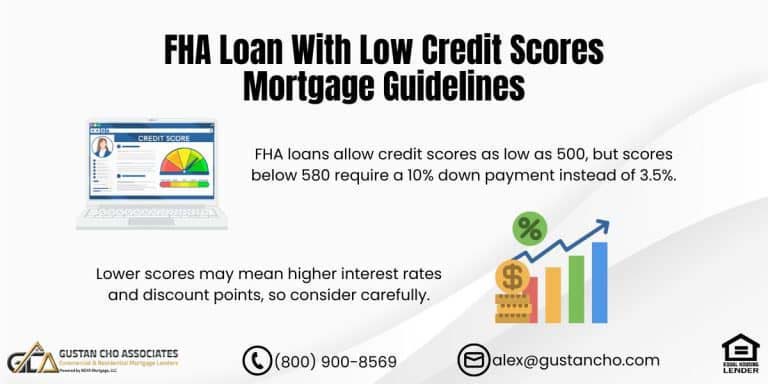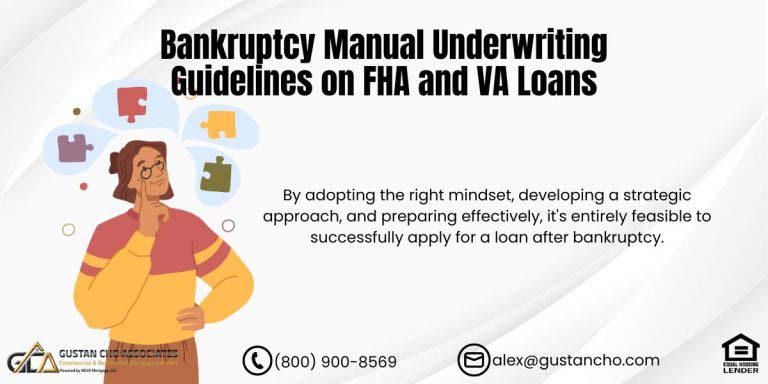This blog will cover Fannie Mae Collection Guidelines on Conventional loans. Fannie Mae and Freddie Mac are the two mortgage giants that regulate agency guidelines on conventional loans. The two mortgage giants are the largest buyers of mortgages on the secondary market. Fannie Mae typically requires a minimum credit score for conventional loans. Credit scores may vary depending on the individual mortgage program and other factors.
Borrowers are generally required to have a certain debt-to-income ratio to qualify for a conventional loan. This ratio compares the borrower’s monthly debt obligations to their gross monthly income.
Fannie Mae, the Federal National Mortgage Association, establishes guidelines for conventional loans it purchases or securitizes. These guidelines cover various aspects of the loan process, including borrower qualifications, property requirements, and loan documentation. While the specific guidelines can change over time and may vary depending on the loan program and other factors. In this guide, we will cover the general aspects of Fannie Mae’s collection guidelines on conventional loans.
Appraisal and Private Mortgage Insurance (PMI) on Conventional Loans
Fannie Mae typically requires a home appraisal of the property to determine its value and ensure it meets the agency’s requirements. Borrowers who make a down payment of less than 20% may be required to pay for private mortgage insurance to protect the lender in case of default. Fannie Mae has various loan programs with different down payment requirements. Conventional loans often require a down payment between 3% to 20% of the home’s purchase price. Fannie Mae establishes maximum loan limits for conventional loans, which can vary depending on location and property type. The property financed with a conventional loan must meet certain standards Fannie Mae sets. This includes requirements related to the property’s condition, occupancy, and value.
Have Collections? You May Still Qualify for a Conventional Loan
Fannie Mae doesn’t always require collections to be paid off. Learn how you can get approved even with outstanding debts.
Underwriting Standards on Conventional Loans
Fannie Mae has specific underwriting standards that lenders must follow when evaluating loan applications. This includes assessing the borrower’s creditworthiness, ability to repay the loan, and the overall risk associated with the loan. Fannie Mae also establishes guidelines for loan servicing, including procedures for handling payments, escrow accounts, and delinquencies. It’s important to note that while Fannie Mae sets these guidelines, individual lenders may have additional requirements or overlays. Borrowers should work closely with their lenders to understand and meet all the requirements for a conventional loan. In the following paragraphs, we will cover and discuss Fannie Mae collection guidelines on conventional loans.
Conventional Loan Collection And Charged-Off Account Requirements and Guidelines
Outstanding collection and charged-off accounts do not have to be paid off to qualify for conventional loans if and only if borrowers are financing an owner-occupant primary home. Many people are under the assumption that conventional loans are for borrowers with great credit. This is true. Fannie Mae and Freddie Mae have higher credit requirements on conventional loans than other mortgage loan programs.
Borrowers must provide various documents to verify their income, assets, and other financial information as part of the loan application process.
Many assume that all collection and charged-off accounts must be paid to qualify for conventional loans. This is not the case. It is correct that conventional loans have higher lending standards than government loans. Borrowers can qualify for conventional loans with less-than-perfect credit. Conventional loan guidelines on outstanding collections or charged-off accounts do not require outstanding collection/charged-off accounts to be paid to qualify for conventional loans. There are specific guidelines on collection and charged-off accounts depending on the type of conventional loan program. Mortgage agency guidelines on collection and charged-off accounts differ on primary owner-occupant mortgages, second homes, and investment properties.
Getting an Approve/Eligible Per Automated Underwriting System on Conventional Loans With Bad Credit
Borrowers can qualify for Conventional Loans with outstanding collections and charge-off accounts. This only holds true if the borrower can get approve/eligible per the automated underwriting system (AUS). Fannie Mae Collection Guidelines are specific for primary, second homes, two to four units, and investment property conventional loans. Fannie Mae Collection Guidelines on primary home loans differ from investment conventional loans.
Fannie Mae Collection Guidelines For One-Unit Primary Conventional Loans
Fannie Mae Collection Guidelines on primary single-family homes are very lenient. For primary single-family properties, borrowers do not have to pay outstanding collections accounts to qualify for conventional loans. Borrowers are not required to pay outstanding charged-off accounts either on the owner-occupant primary home financing. Here is what Fannie Mae States With Regards To Fannie Mae Collection Guidelines:
Fannie Mae Collection Guidelines on 2 To 4 Unit Properties and Second Homes
Fannie Mae Collection Guidelines on Second Homes require any collections and charge-off accounts greater than $5,000 to be paid at and before closing. The maximum outstanding and charge-off account borrowers can have on their credit report is $5,000 when buying a second home.
Worried About Collections on Your Credit Report?
We’ll help you navigate Fannie Mae’s guidelines and determine if you can qualify without paying off collections.
Fannie Mae Conventional Loan Guidelines on Collections and Charge-Offs on Two-To-Four Unit Homes
Fannie Mae Collection Guidelines on two to four-unit multi-family properties require any outstanding collections and charge-off accounts greater than $5,000 to be paid off. This is not the case when qualifying for a primary one-unit home. Per Fannie Mae Collection Guidelines, borrowers with outstanding collection and charged-off accounts do not have to pay them off if they qualify for a one-unit primary owner-occupant home. Here is what Fannie Mae states on Fannie Mae Collection Guidelines On 2 To 4-Unit Properties:
Fannie Mae and Freddie Mac Conventional Loan Guidelines on Collection and Charge-Off Accounts on Investment Homes
Investment properties have stricter guidelines regarding outstanding collections and charge-off accounts. This is because investment properties are considered riskier investments. Mortgage rates on investment properties are substantially higher than owner-occupant primary homes due to layered risks on investment versus owner-occupant homes. Here are the guidelines on collections and charge-off accounts when it comes to investment properties: If the borrower has outstanding collections and charged-off over $250, the unpaid outstanding balance must be paid off to qualify for investment conventional loans. If the borrower has a total of $1,000 or greater in total collections and charge-off accounts on their credit report, it needs to be paid off if they need to qualify for investment property loans.
Does Older Outstanding Collections Count Towards Debt-To-Income Ratio Calculations
In this paragraph, we will compare FHA Versus Fannie Mae Collection Guidelines. Here are HUD Guidelines on collections and charge-off accounts on FHA loans: Outstanding collections and charge-off accounts do not have to be paid to qualify for FHA loans. However, with non-medical outstanding collections with a balance of over $2,000, HUD requires mortgage underwriters to take 5% of the outstanding collection balance and use it as a hypothetical monthly debt. This holds true even though borrowers do not have to pay. This only holds true on non-medical collections. Medical collections and charge-off accounts are exempt from the 5% rule. This holds true no matter how large the outstanding balance of the medical collection and charged-off account is.
Fannie Mae Guidelines on Collections and Charged-Off Accounts on Single-Unit Owner-Occupant Primary Homes
Fannie Mae Guidelines on collections and charge-off accounts on Single-Unit Primary Owner-Occupant Conventional loans. Outstanding collection and charge-off accounts do not have to be paid on primary owner-occupant one-unit conventional loans. With non-medical outstanding collections with a balance of over $2,000, Fannie Mae does NOT require mortgage underwriters to take 5% of the outstanding collection balance and use it as a hypothetical monthly debt like FHA loans. Borrowers do not have to pay anything. The 5% hypothetical debt rule used for debt-to-income ratio calculations does not apply to conventional loans.
How Collection Accounts Affect Borrower’s Debt-To-Income Ratio Calculations
Gustan Cho Associates is a mortgage broker licensed in 48 states with a national reputation for being able to do mortgage loans other lenders cannot do. Over 75% of our borrowers could not qualify at other lenders due to overlays, stress, last-minute loan denial, or not having the mortgage products. At Gustan Cho Associates, we only market existing mortgage loans that are possible at competitive rates. Besides government and conventional loans with no lender overlays, we offer hundreds of non-prime mortgage programs, including non-QM and non-prime mortgages.
Mortgage Lenders For Bad Credit With No Overlays
For more information about this blog or other mortgage-related topics, please contact Gustan Cho Associates at 800-900-8569 or text us for a faster response. Or email us at gcho@gustancho.com. The team at Gustan Cho Associates is available seven days a week, evenings, weekends, and holidays. The team at Gustan Cho Associates of veteran mortgage professionals are ready to answer any questions home buyers or homeowners with mortgage inquiries.
Gustan Cho Associates Information Resource Center is a group of real estate and mortgage industry experts, which includes the following: real estate agents, residential mortgage loan officers, and industry experts whose mission is to provide information about real estate, conforming loans, non-conforming loans, and specialty financing programs.
The mortgage industry is so complex, with new regulations that are constantly changing. New rules and regulations are being implemented, and our goal is to express the opinions of industry experts and offer their opinions. Company NMLS 1660690 Branch NMLS 2315275. Gustan Cho Associates is a national mortgage company with no lender overlays on government and conventional loans. Over 80% of our borrowers at Gustan Cho Associates could not qualify at other lenders due to their lender overlays. We also offer dozens of non-QM and alternative financing mortgage programs.
What Are Conforming Versus Non-Conforming Mortgage Loans?
Conventional loans are often referred to as conforming loans. This is because conventional loans must conform to Fannie Mae and Freddie Mac agency guidelines for the two giant Government Sponsored Enterprises (GSE) to purchase mortgages. The two GSEs only buy mortgages that conform to their guidelines. Any mortgages that do not meet Fannie/Freddie Guidelines are called non-conforming loans. Fannie Mae and Freddie Mac have specific conforming loan guidelines on collections and charged-off accounts depending on whether it is owner-occupant primary residence homes, second homes, or investment property loans.
Don’t Let Old Collections Hold You Back
Fannie Mae offers flexibility—especially on certain types of collections. Let us help you take advantage of it.











WRONG. those might be your lenders guidelines but not Fannie guides.
What is wrong about it? I will get you the actual screenshot of the guidelines from Fannie Mae allregs.
I’m with Robert on this. Where in FNMA’s B3-6-05 – Monthly Debt Obligations does it say collections must be included in the DTI?
We have some investors with overlays that require it, but others that don’t. I’ve also been at multiple companies where we have sold directly to FNMA/Freddie with collections excluded from the DTI without any issue.
Travis and Robert. You are correct. It is just on FHA loans where they hit you for 5% of the outstanding collection balance on non-medical collections over $2,000. Not charged off accounts. Thank you for the clarification. Really appreciate it.
Greetings,
I am currently in Chapter 13 (as of April 2018) and have 21 months left of payments. I am interested in a mortgage cashout refinance to be able to pay off the remaining balance of my Chapter 13 (approximately $15K left to pay – I have obtained a payoff quote which is attached), and for educational expenses for my son who is going to college at the end of this year. Overall, my main goal is to pay off my Chapter 13 balance. We would like to determine our eligibility, and if eligible, the current terms before submitting to our bankruptcy lawyer (note: we filed bankruptcy in Georiga in 2018 before moving to Florida, where we have resided since August 5, 2018). This home is our primary residence and we intend to remain in it.
Additional information:
My spouse and I are both US Veterans (Airforce and Army).
I am a veteran with a 60% disability rating and my spouse is at 10%.
We have used my husband’s VA loan benefits but paid off that home, so neither of us has an active VA loan.
Our current mortgage is under an FHA loan.
– Our loan has currently been sold at least three times to new mortgage loan servicers, and we are currently in the process of being transferred to another servicer while we have an active loan modification
– The last servicer was Shellpoint Mortgage, and as of December 2021 they have sold our loan to Gregory Funding LLC, and then to Sutton Funding LLC; recently within the same month, a new letter was sent indicating the loan was sold back to Gregory Funding LLC, but no additional information has been provided as of yet.
– I have attached the last correspondence regarding our loan modification from Shellpoint to confirm the current terms of our mortgage
I am currently employed full-time and receive VA disability compensation at 60%
My spouse is unemployed and receives VA disability compensation at 10%
My mother resides with us and pays monthly rent and other expenses towards the home
I look forward to speaking with you, please let us know if anything additional is needed.
I am confident we can help you. Please reach out to me and my team at gcho@gustancho.com
For investment properties would Fannie require you to pay off “MEDICAL” collection? Or would these be exempt from the rule as they are with FHA?
Up to a certain limit. Please contact us at gcho@gustancho.com.